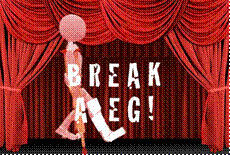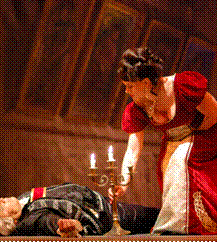
Главная страница Случайная страница
Разделы сайта
АвтомобилиАстрономияБиологияГеографияДом и садДругие языкиДругоеИнформатикаИсторияКультураЛитератураЛогикаМатематикаМедицинаМеталлургияМеханикаОбразованиеОхрана трудаПедагогикаПолитикаПравоПсихологияРелигияРиторикаСоциологияСпортСтроительствоТехнологияТуризмФизикаФилософияФинансыХимияЧерчениеЭкологияЭкономикаЭлектроника
⚡️ Для новых пользователей первый месяц бесплатно. А далее 290 руб/мес, это в 3 раза дешевле аналогов. За эту цену доступен весь функционал: напоминание о визитах, чаевые, предоплаты, общение с клиентами, переносы записей и так далее.
✅ Уйма гибких настроек, которые помогут вам зарабатывать больше и забыть про чувство «что-то мне нужно было сделать».
Сомневаетесь? нажмите на текст, запустите чат-бота и убедитесь во всем сами!
Superstitions at the Theater
|
|
The opera and theater world is steeped in tradition and superstition. Many singers and actors have talismans or have pre-performance rituals (step on to the stage only with their right/left foot first, touch the curtain, be the first/last person to exit their dressing room, talk in the green room, never go into the green room). While individual superstitions are varied and many, there are also collective superstitions that permeate the industry. The true origins of many of these superstitions and traditions have been lost over time.
 " Break a Leg! "
" Break a Leg! "
Never wish an actor or singer good luck before a performance. Common practice is to encourage a performer to break a leg. The origin of the phrase, " Break a leg! ", is much disputed.
Many claim the expression originated as a reference to the great nineteenth-century French actress, Sarah Bernhardt, who had her leg amputated. The rationale of this origin seems to be that Bernhardt had an amazing career, and so if people wish you a broken leg you will have the same success.
Eric Partridge's Dictionary of Catch Phrases thinks that there is a connection with the German phrase " Hals und Beinbruch, " an invitation to break your neck and bones. While German aviators used this phrase, English-speaking aviators say " Happy Landings."
More generally, in many superstitions, wishing one bad luck is actually good luck. " Popular folklore down through the ages is full of warnings against wishing your friends good luck. To do so is to tempt evil spirits or demons to do your friend harm. Better to outwit the demons (who must be rather dim) by wishing your friend bad fortune."
No whistling backstage!
Some superstitions likely have roots related to particular safety issues. To whistle backstage is a serious taboo.
Long ago, theaters (during non-sailing season) would hire sailors to work the fly loft. (This makes perfect sense when you look at the rails of any theater.) Sailors’ communication while on ships consisted of whistles. With sailors in the fly loft, someone whistling in the theater might cause a sandbag to fall to the stage. While theaters now only hire stage hands with tremendous schooling and talent, the tradition remains. Whistling backstage is not likely to bring a sandbag down on your head, but is considered bad luck nonetheless.
 Tosca
Tosca
Many theater people avoid saying the name of Shakespeare’s cursed “Scottish Play”, as the very word brings on bad luck. Opera has its equivalent: Puccini’s Tosca is cursed. While there is no prohibition about saying the name in the theater, the stories of troubled performances of Tosca are many.
There is the popular legend of the bouncing Tosca. Depending on the source and story-teller, the details vary. (At least four sopranos have starred in this story, in different versions.) Basically, Tosca jumps off the parapet and instead of finding the traditional “Tosca matress” for her landing, the crew have replaced it with a trampoline. The Tosca then bounces back into view a varying number of times.
The tradition of Toscas singing “Vissi d’arte” while lying on the floor can be credited with a mishap. During a performance at the Met in the ‘20s, Maria Jeritza had fallen during her fight with Scarpia and completely unfazed, she proceeded to sing the famous aria from the floor.
In a 1965 performance with Maria Callas as Tosca and Tito Gobbi as Scarpia, Callas’ wig caught fire. Gobbi being the consummate professional rechoreographed the fight scene to put out the flames without incident or injury. That same year in Rome, while playing Cavaradossi, Gianni Raimondi suffered burns to his face when a prop gun misfired during the execution scene.
Following in Callas’ footsteps, Russian soprano, Galina Vishnevskaya’s wig caught fire in a Vienna production in the ‘70s. Her Scarpia and Cavaradossi came to her aid, and luckily she suffered only minor burns to her scalp.
While singing at the Met in 1986, Eva Marton took an elbow to her face from her Scarpia, Juan Pons, resulting in a broken jaw.
In a Tosca at the Minnesota Opera in 1993, Elisabeth Knighton Printy jumped from the parapet, missed the Tosca pad and suffered two broken legs.
Seattle Opera’s productions of Tosca have not involved major fires or physical injuries. We just decided to embrace the bad luck by scheduling the Nisqually earthquake during our 2001 run of Tosca.
|
|
